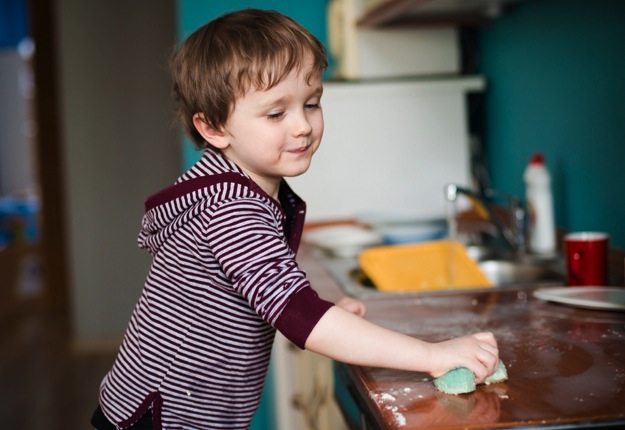How to go about dishing out the household jobs and still avoid the endless squabble.
Giving out household responsibilities without a doubt has the potential to cause great conflict between parents and children, so finding a way to avoid the squabble and getting everyone to pitch in will be important in helping your children become active contributors to the household.
Getting your child involved in jobs around the house is important for everyone. For children it’s the start of fostering a sense of responsibility, and for parents it can stop them feeling like a ‘maid’ to their children. The key is to make household responsibilities a natural part of your children’s lives as they grow up, rather than
feeling the need to bribe, threaten and continuously having ask them for something to be done.
Children learn most from what they experience for themselves. Giving children tasks from a young age will build their work ethic, sense of responsibility and organisation for later in life. It will also help them feel like a contributing member of the family.
Start with simple tasks and consider what you think is important for your child to learn. Make sure you weigh up the age appropriateness and what they are realistically capable of doing. Motivate your child to get it done by giving praise, show an interest in what they have completed and if necessary, explain how they
can do it better next time as opposed to criticising.
Children will likely test the boundaries to see how much power they have, so it is important parents are clear, calm, consistent and assertively in charge. As a family you need to develop a culture of being considerate by getting children to help with everyday tasks, like washing up or making your bed, without linking it to a reward.
A simple ‘thank you’ should be seen as reward enough.
Dr Anna Cohen, Sydney’s leading Clinical Child Psychologist offers parents advice on getting children to undertake jobs to help out without the struggle and conflict.
- Manage your expectations. All children require limits to know what is expected of them. While these may vary between households, they will be most effective in small numbers. Involving your child in creating these expectations is a great way to ensure they are followed and they understand them. Consequences can be applied if expectations are not met, however, it is essential they be stated in a positive and appropriate manner. For example, ‘You need to unpack the dishwasher before you can watch television’. Starting at an early age will be key, with as simple tasks as helping to pack away their toys.
- Give effective instruction. A common error parent’s make when asking their child to do a task is how they give the instructions. Parents will often issue an instruction as a question and receive no response. Feeling ignored, parents can become angry and raise their voice, which only leads to parents being frustrated and angrier and often results in conflict rather than compliance. When we give clear, calm instructions, children are more likely to comply. Clear instructions imply that an action is required. For example ‘It’s time to come and help with the dishes now.’ There is a clear direction and expectation that the children will understand.
- Use choices. Choices allow children to evaluate things for themselves and to understand consequences through taking responsibility for their own behaviour. As your child gets older, choices will become more important in getting them to comply, as they like to feel they have a say and control in their own lives, even on a small scale. Limiting to just two options, you can offer your child a choice relating to how they could do a task, or when they would like to do it such as ‘Would you prefer to put away the washing now or after dinner?’
- Consequences. Consequences work well when approached through choice. If your child does not respond to an instruction to pack away their toys, refer back to the expectations you created together. For example, ‘Remember our agreement that we tidy up after playing. Do you want to pack your toys away now with my help or do you want to do it during television time?’ It’s important to be consistent and follow through with any stated consequence.
Giving your child household responsibilities may be challenging at first, as parents feel it is easier to do it themselves, but giving your child the opportunity to contribute even if it is less efficient, is important.
It will enable them to develop life-skills such as understanding how to look after themselves, taking responsibility and contributing to the family. Over time, these jobs will become a natural part of your child’s routine. While they may groan and not enjoy doing the task, they will feel satisfaction from completing something and helping even in a small way.
Do your children help out with household chores?
Share your comments below




















-

-
-
meedee said
- 06 Oct 2022
-

-
-
mom183717 said
- 05 Apr 2019
-

-
-
Blossom said
- 07 Sep 2018
-

-
-
sars_angelchik said
- 31 Jul 2018
-

-
-
ella12 said
- 30 Jul 2018
-

-
-
tessie said
- 30 Jul 2018
-

-
-
mom101628 said
- 27 Jul 2018
-

-
-
mom74005 said
- 27 Jul 2018
-

-
-
LuckyMum said
- 26 Jul 2018
-

-
-
Ellen said
- 26 Jul 2018

-

-
-
mom93821 said
- 26 Jul 2018
-

-
-
mom265671 said
- 25 Jul 2018
-

-
-
Amanda Holland said
- 25 Jul 2018
Post a comment11:46 am
2:46 pm
9:26 pm
1:22 pm
4:22 pm
8:50 am
10:33 pm
7:10 am
11:27 pm
-

-
-
mom93821 replied
- 27 Jul 2018 , 4:53 am
Reply7:49 am
6:08 am
11:31 pm
4:31 pm
To post a review/comment please join us or login so we can allocate your points.